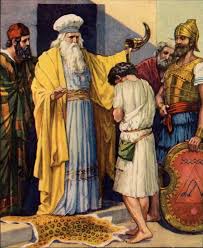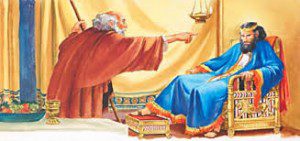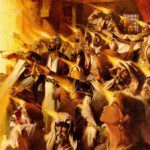Jeanne has decided to take a graduate theology course on campus this summer, taught by an emeritus professor friend who has been at the college for three decades. The course is “The Prophetic Faith,” described as a study of “the prophetic writings of Ancient Israel, examining both their original message and their relevance for contemporary readers.” After looking over the syllabus, I thought it would be fun to sit in on this class as well. I may regret this. The course starts in three weeks, is a six-week course that meets twice per week for three hours each meeting, and has an extensive reading list, including all of the major and minor prophets from the Jewish scriptures and three secondary texts that we will be reading in their entirety. I don’t know many people whose idea of summer fun is to take such a graduate course, but we are two of those people.
As I started reading the assigned pages for the first class, I was reminded of the role that prophets played during the relatively brief period during which Israel had kings. Prophets not only anointed kings, they also often were the only persons who spoke truth to power, the moral compass who told the king when he was in danger of violating, or already had violated, the moral demands of God’s law. The most famous king of Israel, of course, was David.  David was anointed king by the prophet Samuel after Saul, the first king of Israel, ran afoul of God’s commandments one too many times. By the time David secured his throne after more than a decade of warfare, Samuel had died and a new prophet, Nathan, stepped into Samuel’s role. A well-known story from Second Samuel illustrates how one of the prophet’s most important roles was to speak truth to power—especially when that truth was something the king did not want anyone to know.
David was anointed king by the prophet Samuel after Saul, the first king of Israel, ran afoul of God’s commandments one too many times. By the time David secured his throne after more than a decade of warfare, Samuel had died and a new prophet, Nathan, stepped into Samuel’s role. A well-known story from Second Samuel illustrates how one of the prophet’s most important roles was to speak truth to power—especially when that truth was something the king did not want anyone to know.
The sordid tale of David and Bathsheba is one of the most familiar stories from the Jewish scriptures. David is at the height of his power and, as many who find themselves in such a position, is of the opinion that this entitles him to anything that he wants. Including the beautiful wife of one of his top generals. When Bathsheba becomes pregnant due to their affair, David’s attempts to cover it up quickly escalate, culminating in the death of her husband, Uriah, when David has him placed on the front lines of battle where he is sure to be killed. After a suitable period of mourning, David marries Bathsheba (she joins his group of several wives) and all seems quiet on the home front.
Then one day Nathan tells David a story, a time-worn tale of the rich exploiting the poor.  A rich man, who had everything—including more sheep than he could count—had a unexpected visitor for whom he wanted to host a memorable dinner. Down the road lived a poor man with only one little sheep who was more of a pet than anything else. Any animal lover will resonate with this passage: “The ewe lamb grew up together with him and with his children. It ate of his own food and drank from his own cup and lay in his bosom; and it was like a daughter to him.” The rich man, wanting to serve mutton at the banquet for his guest, instead of selecting an appropriate sheep from his numerous flock, took the poor man’s only lamb and served it to his guest for dinner. The bastard.
A rich man, who had everything—including more sheep than he could count—had a unexpected visitor for whom he wanted to host a memorable dinner. Down the road lived a poor man with only one little sheep who was more of a pet than anything else. Any animal lover will resonate with this passage: “The ewe lamb grew up together with him and with his children. It ate of his own food and drank from his own cup and lay in his bosom; and it was like a daughter to him.” The rich man, wanting to serve mutton at the banquet for his guest, instead of selecting an appropriate sheep from his numerous flock, took the poor man’s only lamb and served it to his guest for dinner. The bastard.
Not surprisingly, David’s sense of justice and fairness is scandalized by Nathan’s story. “WTF!!!” David yelled. “As the LORD lives, the man who has done this shall surely die! And he shall restore fourfold for the lamb, because he did this thing and because he had no pity.” And in four of the most effective words ever spoken to power,  Nathan springs his trap: You are the man! Because, of course, David is the rich man in the story, Uriah is the poor man, and Bathsheba is the poor man’s only ewe lamb. The kingdom is not taken from David, although prophets in the past have done precisely that (Samuel from Saul) in the aftermath of serious sin, but David pays a price for the rest of his life. The child Bathsheba is bearing dies, and over time three of David’s sons from different mothers seek to take the throne from David and die in their unsuccessful attempts. There is no peace in David’s house for the rest of his life, although his second child with Bathsheba—Solomon—follows him as king upon David’s death. But most important is David’s reaction when he finds out the true meaning of Nathan’s story. David is crushed, realizes that he has violated and ignored any number of moral principles, and he repents—accepting God’s judgment as communicated through Nathan and as borne out over the following years.
Nathan springs his trap: You are the man! Because, of course, David is the rich man in the story, Uriah is the poor man, and Bathsheba is the poor man’s only ewe lamb. The kingdom is not taken from David, although prophets in the past have done precisely that (Samuel from Saul) in the aftermath of serious sin, but David pays a price for the rest of his life. The child Bathsheba is bearing dies, and over time three of David’s sons from different mothers seek to take the throne from David and die in their unsuccessful attempts. There is no peace in David’s house for the rest of his life, although his second child with Bathsheba—Solomon—follows him as king upon David’s death. But most important is David’s reaction when he finds out the true meaning of Nathan’s story. David is crushed, realizes that he has violated and ignored any number of moral principles, and he repents—accepting God’s judgment as communicated through Nathan and as borne out over the following years.
 There are any number of contemporary applications of Nathan’s story, including how the one percent regularly succeed at the expense of the ninety-nine percent, as well as proposed budgets that favor the rich among us at the expense of the poor. But today I am thinking of one obvious application. As I have watched the developing and intensifying shit show surrounding the Trump presidency over his first four months in office, I have occasionally (when I was not screaming at the television) wondered “What does this guy need? What could possibly set this on the right, or at least a less dysfunctional, path?” As I read one of my favorite stories from the Jewish scriptures for the first time in many years, it was crystal clear to me what Trump needs. He needs an Old Testament prophet in his life. He needs a Nathan. He needs someone who will, when necessary, tell him the unvarnished truth. Tell him when he’s not thinking clearly. Take his phone away so he can’t tweet anymore. Tell him when he’s being a jerk.
There are any number of contemporary applications of Nathan’s story, including how the one percent regularly succeed at the expense of the ninety-nine percent, as well as proposed budgets that favor the rich among us at the expense of the poor. But today I am thinking of one obvious application. As I have watched the developing and intensifying shit show surrounding the Trump presidency over his first four months in office, I have occasionally (when I was not screaming at the television) wondered “What does this guy need? What could possibly set this on the right, or at least a less dysfunctional, path?” As I read one of my favorite stories from the Jewish scriptures for the first time in many years, it was crystal clear to me what Trump needs. He needs an Old Testament prophet in his life. He needs a Nathan. He needs someone who will, when necessary, tell him the unvarnished truth. Tell him when he’s not thinking clearly. Take his phone away so he can’t tweet anymore. Tell him when he’s being a jerk.  Tell him that being elected President does not entitle him to do or say anything he wants. Tell him that a person is not a loser just because that person disagrees with him.
Tell him that being elected President does not entitle him to do or say anything he wants. Tell him that a person is not a loser just because that person disagrees with him.
The problem, of course, is that although there are all sorts of warring factions within Trump’s sycophantic entourage, there is no person who is either equipped or willing to be Trump’s Nathan. Nor is there the slightest indication that Trump would allow such a person into his life even if such a person existed. In ancient Israel, the prophet served, among other things, as a reminder to the king that there is a lot more going on than just our day-to-day human reality. The king is not the center of the universe, nor is anyone else. All of us are answerable to standards and principles that we neither invented nor are immune to. There are things greater than any individual. David knew this; hence, he repented in the wake of Nathan’s story. Trump does not appear to know this. There seems to be no other touchstone of authority in his life than himself. And this is not only sad, it is dangerous. As things devolve over the coming weeks, as they inexorably will, Trump will be looking for any number of persons to blame as he circles down the drain. And someone needs to tell him: You are the man.













